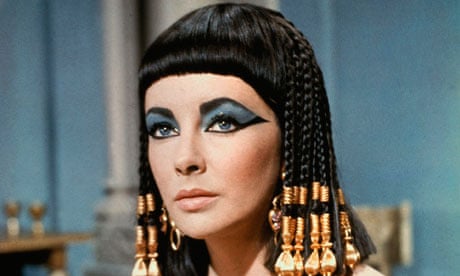To understand the scale of the budgetary and box-office double-whammy that did for Joseph L Mankiewicz's elephantine 1963 version of Cleopatra, it's worth noting that of the 50 most expensive movies ever made, adjusted for inflation, Cleopatra is the only one on the list that was released before 1998 – and at no 15, it's still a major contender. The budget was around $44m ($320m in today's money), the kind of outlay that might have helped Nasa put a man on the moon by 1966.
The weird thing was that, even on this unprecedented scale of loss, Cleopatra, hampered by its lengthy and event-filled gestation process – which included Elizabeth Taylor's near-fatal illness and the film's subsequent relocation to Rome's gigantic Cinecitta Studios – and by the publicity attending the scandalous affair between Taylor and Richard Burton (both then married to other people), still managed also to be the biggest US movie hit of 1963. Even so, it was a financial disaster for 20th Century Fox. It also more or less killed off the big-budget period epic for ever, just as The Greatest Story Ever Told killed off the biblical epic in 1965, and Heaven's Gate would finally kill off the long-moribund classic studio western in 1980. Flops on this scale are like suicides, they take everyone else down with them.
So what did Cleopatra give us in return? A bloated and tedious, neverending yawner that flashes briefly to life in a couple of spectacle sequences – the battle of Actium and Cleo's entry into Rome – and some stretches of pungently witty dialogue, especially when Rex Harrison's Caesar is still around. That's what Mankiewicz was good at – talk – so how he ended up on the bridge as this ship went down can only be accounted for by that special hidebound, gerontocratic mindset that still governed the 1960s studios.
But my foremost memories of the movie are the holiday afternoons of my childhood and adolescence, usually Easter or Christmas, when the BBC afternoon schedules freed up a bit and this thing would be spread across an unconscionably large temporal acreage of good telly-time that might otherwise have been filled with Where Eagles Dare or I Was Monty's Double, or both of them, come to think of it. You could go out for a walk, read a book, do your homework and find Cleopatra still grinding on hours later. It felt like as if it took longer for me to watch it than it took for them to make it.
One thing I do miss now, though, is movies like Cleopatra that, thanks to their sheer misconceived artistic awfulness, in combination with some suicidally reckless extravagance in the budgetary realm, had the capacity to bring a major studio perilously near to bankruptcy and ruin. That kind of thing just doesn't happen enough any more, but I can think of some contemporary studios I'd dearly love to see suffer that fate.

Comments (…)
Sign in or create your Guardian account to join the discussion